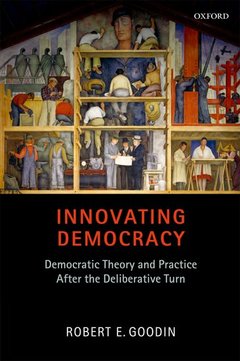Description
Innovating Democracy
Democratic Theory and Practice After the Deliberative Turn
Author: Goodin Robert E.
Language: English
Subject for Innovating Democracy:
Innovating democracy: democratic theory and practice after the deliberative turn (paperback)
Publication date: 05-2012
326 p. · 16.2x23.4 cm · Paperback
Publication date: 05-2012
326 p. · 16.2x23.4 cm · Paperback
Innovating democracy: democratic theory and practice after the deliberative turn
Publication date: 07-2008
326 p. · 16.2x24 cm · Hardback
Publication date: 07-2008
326 p. · 16.2x24 cm · Hardback
Description
/li>Contents
/li>Biography
/li>
In recent years democratic theory has taken a deliberative turn. Instead of merely casting the occasional ballot, deliberative democrats want citizens to reason together. They embrace 'talk as a decision procedure'. But of course thousands or millions of people cannot realistically talk to one another all at once. When putting their theories into practice, deliberative democrats therefore tend to focus on 'mini-publics', usually of a couple dozen to a couple hundred people. The central question then is how to connect micro-deliberations in mini-publics to the political decision-making processes of the larger society. In Innovating Democracy, Robert Goodin surveys these new deliberative mechanisms, asking how they work and what we can properly expect of them. Much though they have to offer, they cannot deliver all that deliberative democrats hope. Talk, Goodin concludes, is good as discovery procedure but not as a decision procedure. His slogan is, 'First talk, then vote'. Micro-deliberative mechanisms should supplement, not supplant, representative democracy. Goodin goes on to show how to adapt our thinking about those familiar institutions to take full advantage of deliberative inputs. That involves rethinking who should get a say, how we hold people accountable, how we sequence deliberative moments and what the roles of parties and legislatures can be in that. Revisioning macro-democratic processes in light of the processes and promise of micro-deliberation, Innovating Democracy provides an integrated perspective on democratic theory and practice after the deliberative turn.
1. Introduction. Micro-deliberation. 2. Making Use of Mini-publics. 3. When Does Deliberation Begin?. 4. Talking Politics: Perils and Promises. 5. How Talk Informs. 6. First Talk, Then Vote. Macro-democracy. 7. Who Counts?. 8. Modes of Democratic Accountability. 9. Sequencing Deliberative Moments. 10. The Place of Parties. 11. Democratic Mandates. 12. Representing Diversity. 13. Conclusion.
Robert Goodin is Distinguished Professor of Social & Political Theory and Philosophy in the Research School of Social Sciences at Australian National University, having previously taught in the Government Department at the University of Essex. He is a Corresponding Fellow of the British Academy, founding editor of The Journal of Political Philosophy and general editor of the ten-volume series of the Oxford Handbooks of Political Science. His work straddles democratic theory (e.g. Reflective Democracy, OUP 2003), empirical welfare-state studies (e.g., The Real Worlds of Welfare Capitalism, CUP 1999; Discretionary Time, CUP 2008) and theoretical reflections on public policy (e.g., Social Welfare as an Individual Responsibility, CUP 1998; What's Wrong with Terrorism? Polity 2006).
© 2024 LAVOISIER S.A.S.
These books may interest you

Deliberative Global Governance 26.38 €



